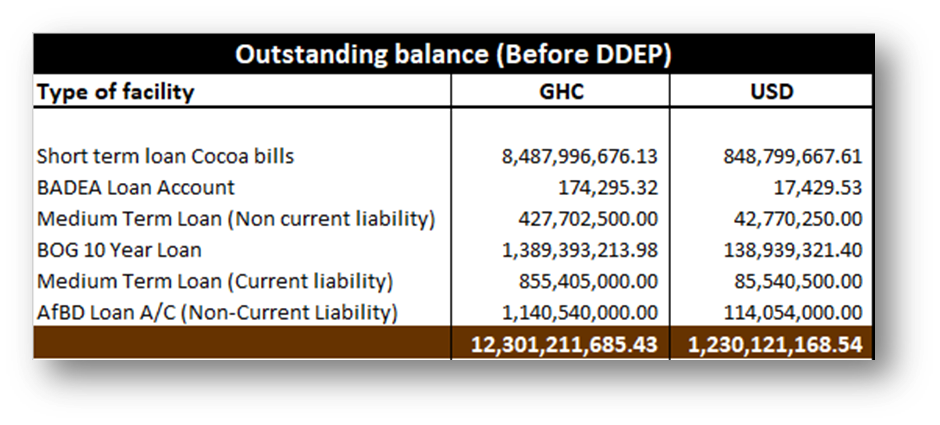The Ghana Cocoa Board’s (COCOBOD) Domestic Bond Exchange
Krobo Fram, Liverpool, UK
January 11, 2024
A 2020 report by the Auditor-General on the public accounts of state-owned corporations and agencies found that Ghana’s cocoa agency or COCOBOD, had accumulated debts which amounted to US$1.23 billion (GHc12.3 billion) at the end of September that year. Additional audit notes indicated that loans servicing cost had also ballooned from US$125.3m (GHc1.25 billion) between the 2018/2019 financial year to US$157.4m (GHc1.57 billion) and the 2019/2020 financial year1.
The “Cocoa Bills” or bonds worth about US$697.7 million (GHS 7.93 billion) represented a large proportion of the debt and were the subject of the domestic debt exchange. On 14th July 2023, the COCOBOD launched a debt exchange program, through which it invited holders of its short-term debt securities to exchange their holdings for new instruments. The issuer offered new debt securities with longer maturities and lower coupon rates (13 percent) in exchange for the old bonds.

Source: Ghana Audit Service, September 2023
Prior to the announcement, Joseph Boahen Aidoo, the Chief Executive of the COCOBOD, released a public statement on July 11th, 2023, in which he explained the context of the program. He said that Cocoa bills were an integral part of the ‟public debt perimeter because of the risk and contingent liability they represent in the global government debt portfolio”. He further stressed the goal of the Cocoa Bills exchange, which was to reduce the excessive financial burden on this state-owned company, specilized in cocoa export. The exchange, he said, will put the COCOBOD on the path of financial sustainability in line with targets defined by the 2023 International Monetary Fund (IMF) agreement with Ghana2.
The COCOBOD initially issued the bills to finance the purchase cocoa from farmers. But low commodities prices on the global market and the negative effects of COVID-19 compromised the ability of the issuer to redeem the bonds.
This led to successive rollovers of the instruments. On May 2nd, 2023, in its debt sustainability analysis, the IMF explained that ‟the COCOBOD operations pose fiscal risks related to its heavy involvement in extra-budgetary spending”. The IMF reiterated that the COCOBOD had accumulated losses for years. These losses, it said, stemmed from the rollover cost of outstanding cocoa bills and from high farm purchase price of cocoa and rising operational costs. Additional expenses included fertilizers import and the renovation of rural roads, which over the years. had become important sources of variable costs3.
According to the Ministry of Finance4, the Cocoa Bills exchange offered five new Cocoa bonds, which will mature between 2024 and 2028. The ministry split the offer into three tranches:
• 5.0 percent of the amount to be exchanged against 2024 bond
• 20.0 percent against 2025 bonds
• 25.0 percent each against 2026, 2027, and 2028 bonds
Challenging financing environment
Debt restructuring is an important step towards financial sustainability. However, it also sends a negative signal about the financial situation of the debtor. Specifically, it affects creditworthiness and increases the cost of borrowing. In 2023, the IMF estimated that Ghana's ‟interest rate on additional borrowing resulting from the stress test was at 9 percent - more than the default rate of 4.9 percent”. This, the fund said, reflected ‟the deterioration in Ghana’s creditworthiness and loss of market access”5. Inevitably, the prevailing macro-economic situation of the country cascades down and exarcerbates existing difficulties of individual public companies such as the COCOBOD.
Despite this challenging financing environment, the COCOBOD published a statement outlining a strategy for the future. On November 10th, 2023, the company announced plans to diversify its source of funding. For the 2023-2024 cocoa purchases, it has ‟a two-prong financing” strategy.
The company started with a pre-financing arrangement with international buyers, which raised an amount of US$400 million. These funds financed the cocoa purchase at the beginning of the season from September 2023. In the second stage, the company sought additional funding from a syndicate of lenders. In the interim, it used non-collateralized cocoa sales proceeds as a bridge finance to start purchase for the 2023-2024 cocoa season6. On November 18th, 2023, the Parliament of Ghana approved an US$800 million loan, requested by the COCOBOD to purchase cocoa for the 2023-2024 season.
Related Articles
BIBLIOGRAPHY
1❩ https://bartalks.net/auditor-general-concerned-by-cocobods-growing-debt/#respond
2❩ International Monetary Fund – IMF (2023): Request for an arrangement under the extended credit facility – Debt sustainability analysis - https://www.elibrary.imf.org/downloadpdf/journals/002/2023/168/article-A002-en.pdf
3❩ IMF (2023) ibid.
4❩ MOFA (2023): Mid-Year Fiscal policy review - https://mofep.gov.gh/sites/default/files/budget-statements/2023-Mid-Year-Policy-Review_1.pdf
5❩ IMF (2023): a: Request for an Arrangement Under the Extended Credit Facility-Press Release; Staff Report; and Statement by the Executive Director for Ghana https://www.elibrary.imf.org/view/journals/002/2023/168/002.2023.issue-168-en.xml
6❩ https://cocobod.gh/news/financing-of-purchases-for-202324-crop-season
